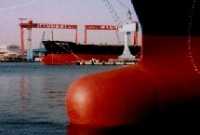Revenues for the quarter fell 28% to USD$399.4 million, hurt by a 3.5% decrease in international passenger movements and a 26% drop in cargo activity at Ben Gurion Airport
El Al Israel Airlines reported last week a net loss of US$19.7 million for the second quarter, widened from a deficit of US$12.8 million in the year-ago period, as revenues plunged 28.4% to $399.4 million paced by a 54% decline in cargo revenues.
Revenues for the quarter fell 28% to USD$399.4 million, hurt by a 3.5% decrease in its international passenger movements and a 26% drop in cargo activity at Tel Aviv's Ben Gurion Airport, which drove down cargo prices significantly.
Despite lower traffic, El Al said its market share grew to 38%, up from 34.6% the same period last year. Its load factor was 77.6%.
Operating expenses for this quarter totaled $353.1 million, compared to $487 million in the parallel quarter last year, a reduction of about 28%. The reduction is due predominantly to a lower aviation fuel expenditure, lower costs of salaries, and adjusting variable expenses to the decline in activity.
The Company’s expenditure for jet fuel dropped from $214.4 million in the second quarter of 2008, to $111.2 million in the second quarter of 2009, a drop of about 48%. The Company’s total expenditure on fuel includes net hedging costs totaling about $17.1 million. By adjusting the Company’s activities to lowered demand, operating expenses dropped by about $26 million, compared the equivalent quarter last year. The ratio of operating expenditure to turnover rose from 87.4% in the parallel quarter of 2008, to 88.4% in this quarter.
El Al President Haim Romano said the financial crisis had "resulted in a significant reduction in passenger movements in general and business passenger movements in particular". Romano noted that: “At a time when most of the world’s airlines report huge losses and revenue reductions, our financial reports reflect vigorous activity and careful controlled expenditure management that succeeded in minimizing potential losses". He added that “During the second quarter, the Company continued to confront the results of the world financial crisis (that included civil aviation), and the aftermath of “Operation Cast Lead”. Both these factors resulted in a significant reduction in passenger movements in general, and in Business passenger movements in particular.
The quarter ended with a total reduction of 12.2% in international passenger movements at Ben Gurion Airport, although for El Al the reduction was less pronounced at “only” about 3.5%.
The company's fuel expenses fell to US$111.2 million from US$214.4 million in the same period last year.
Overall operating expenses fell 28% to US$353.1 million, helped by spending reductions such as on salaries, fuel savings, and a newer aircraft fleet.
During the quarter, El Al launched flights between Tel Aviv and Sao Paulo three times a week. It said it was considering adding more flights to Brazil.
El Al chief financial officer Nissim Malki said the carrier had a cash balance of more than US$157 million "which in the future will help us take advantage of opportunities to develop additional sources of revenue".
El Al Q2 net loss widens - US$19.7
Revenues for the quarter fell 28% to USD$399.4 million, hurt by a 3.5% decrease in international passenger movements and a 26% drop in cargo activity at Ben Gurion Airport
24.08.09 / 00:00
•
More articles that may interest you

Syrian Customs Authority caught goods from Israel

Maersk Line to Raise Rates for Cargoes Moving from Israel

D&B: H1N1 Flu could cost Israel's economy NIS 35b

High Tech exports leading Israeli economic recovery

UBS: Israeli economy to grow at a rate of 2.7% in 2010

Israel Corp. to provide a US$350m emergency cash to rescue Zim
More news from Air Transport Section
>El Al: management and employees agree to suspend labor dispute/10.08.09
>El Al employees declared a labor dispute/03.08.09
>Dispute looms over cargo X-ray machine located at Paris's Charles de Gaulle Airport/03.08.09
>Virgin group in cooperation talks with Israir/27.07.09
>Israeli airlines to offer flights to North America destinations via Europe/20.07.09
>IAA: International travelers in June down 12% at Ben Gurion Airport/20.07.09
>Kazakhstan, Israel signed agreement to strengthen commercial ties/13.07.09
>Israel and Switzerland signed an improved civil aviation agreement/06.07.09
>U.S. Airways inaugurated Tel Aviv-Philadelphia line/06.07.09
>Ministry of Transportation to equip Israeli airlines with laser-based anti missiles system/29.06.09
